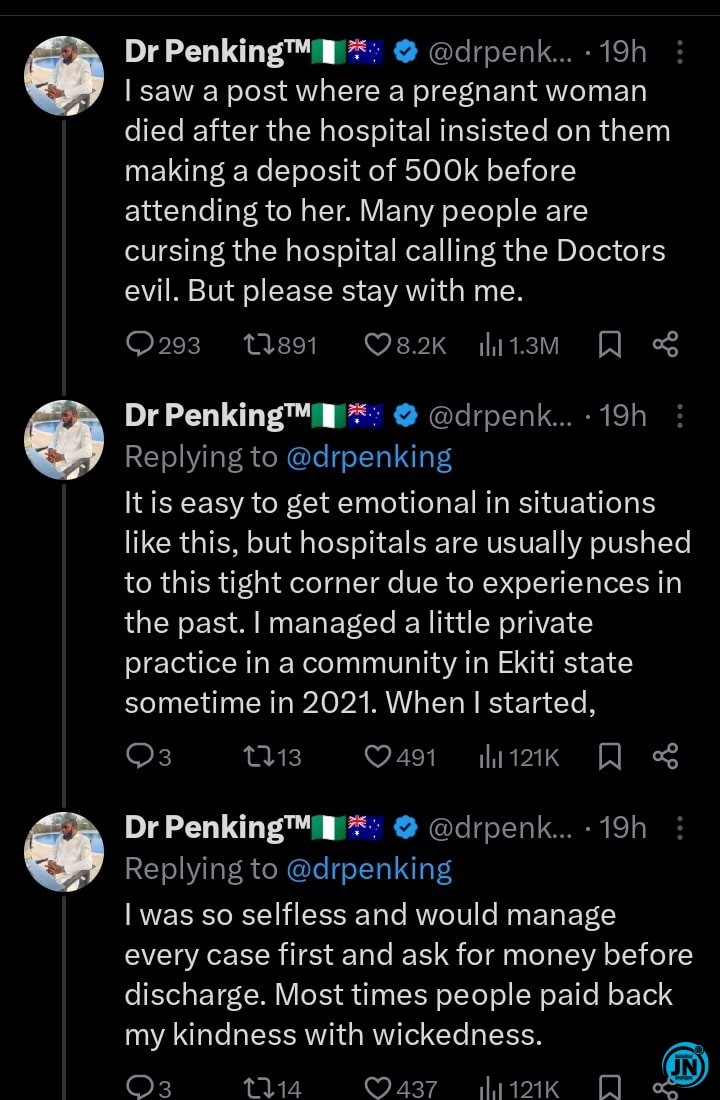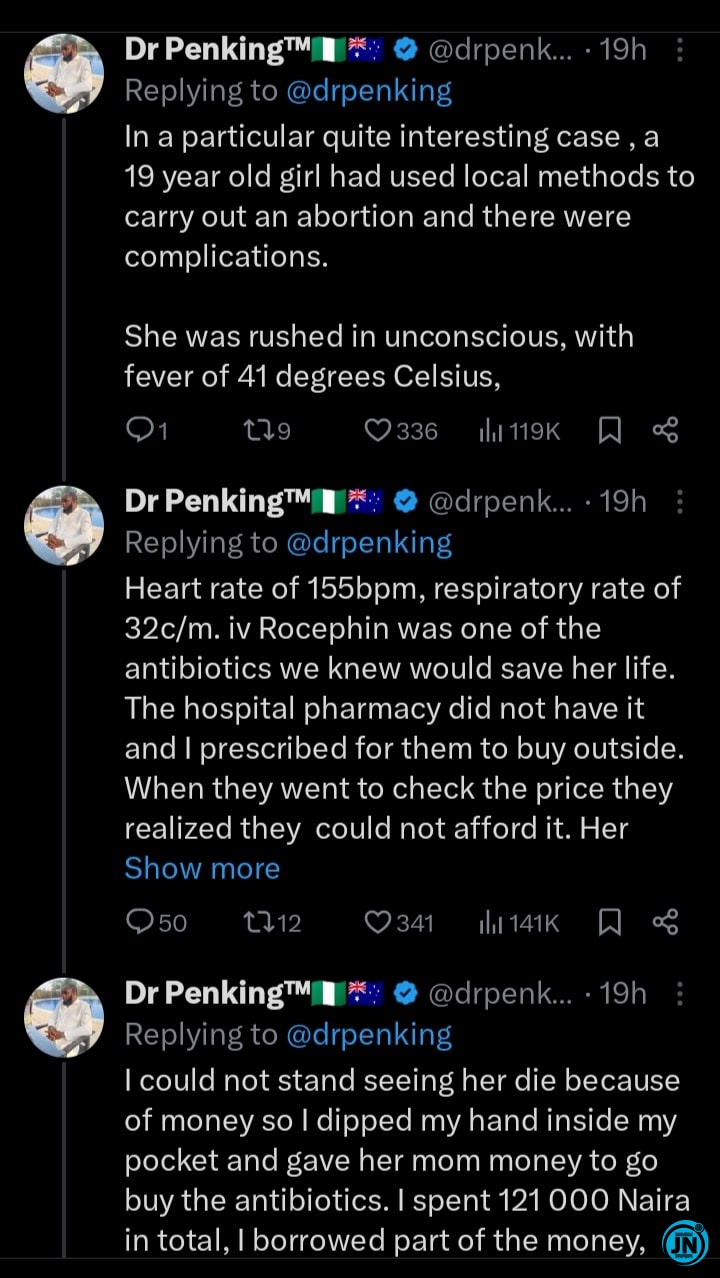A Nigerian doctor has come forward to shed light on the reasons why hospitals should not be hastily blamed when tragic incidents occur, such as the recent case of a pregnant woman who reportedly passed away after a hospital allegedly refused to treat her without a N500K deposit. He explained that while such situations are deeply emotional and heartbreaking, there are often underlying factors that force hospitals to adopt strict policies regarding deposits before treatment.
It would be recalled that news recently broke about a pregnant woman who lost her life after the hospital in question insisted on receiving a deposit of N500,000 before commencing treatment. The report stirred widespread outrage among Nigerians, with many taking to social media to express their anger, condemning the hospital and its staff for prioritizing money over human life.

However, in response to the uproar, a well-known Nigerian doctor, Dr Penking, took to social media to share his own experience in the medical field, highlighting how the goodwill of some hospitals and doctors is often met with deceit, financial loss, and betrayal by patients and their families.
Dr Penking recounted a personal encounter with a patient, revealing how he once went out of his way to financially assist a family in dire need, only to be repaid with dishonesty. He described a painful experience where he had borrowed money to buy life-saving medication for a patient, believing that the family would reimburse him after the treatment. To his utter dismay, the patient and their relatives disappeared as soon as the treatment was successful, leaving him with a financial burden and a difficult lesson learned.

“I saw a post where a pregnant woman died after the hospital insisted on them making a deposit of 500k before attending to her. Many people are cursing the hospital calling the Doctors evil. But please stay with me.
It is easy to get emotional in situations like this, but hospitals are usually pushed to this tight corner due to experiences in the past. I managed a little private practice in a community in Ekiti state sometime in 2021. When I started,
I was so selfless and would manage every case first and ask for money before discharge. Most times people paid back my kindness with wickedness.
In a particular quite interesting case, a 19-year-old girl had used local methods to carry out an abortion, and the procedure resulted in life-threatening complications. She was rushed into my hospital unconscious, burning with a high fever of 41 degrees Celsius, and her vital signs were dangerously unstable.
Her heart rate was 155 beats per minute, and her respiratory rate was at a critical 32 cycles per minute. The only way to save her was through aggressive treatment with intravenous antibiotics, including Rocephin, a high-quality and highly effective brand of Ceftriaxone. Unfortunately, my hospital’s pharmacy did not have the medication in stock, and when her family was asked to purchase it from an external pharmacy, they realized they couldn’t afford it.
Her mother broke down in tears, wailing uncontrollably because she had no means to save her daughter’s life. Seeing their pain, I couldn’t stand by and watch the young girl die just because of money. I reached into my own pocket and handed her mother the money needed to buy the antibiotics. In total, I spent N121,000, a sum that I had to borrow partly, hoping that I would be reimbursed once the girl recovered.
Day after day, vial after vial, we administered the expensive Rocephin, watching as she gradually regained consciousness. The fever subsided, her heart rate normalized, and her breathing improved. It was a slow but steady journey to recovery, and everyone, including myself, was overjoyed to see her getting better. I felt fulfilled, knowing that I had saved a life.
But my happiness was short-lived. One morning, I arrived at the hospital, ready to continue my rounds, only to be met with a rude shock.
The patient, Itunu, and her mother had disappeared from the hospital without paying a single naira for their treatment. They had not only failed to settle the hospital bill, but they also vanished without reimbursing the money I had borrowed for her antibiotics.
At that moment, I made a firm and painful decision that would shape the rest of my medical career—I vowed never to treat another patient without receiving a deposit first. I also resolved never again to use my personal money for a patient’s treatment, no matter how desperate the situation appeared. Of course, when I started implementing this policy, people called me a heartless and wicked doctor, but they had no idea about the experiences that led me to that point.”
Dr Penking’s post resonated with many, shedding light on the difficult decisions doctors and hospitals often face in a country where medical bills are not easily affordable. While the death of the pregnant woman is undeniably tragic, his story highlights the broader issue of patients absconding without paying, leaving hospitals and doctors financially strained and unable to continue offering help to those in need.
His experience raises an important discussion about healthcare financing in Nigeria, the moral dilemmas faced by medical professionals, and the desperate need for government intervention to ensure that medical emergencies can be handled without putting hospitals at financial risk.
As the debate continues, many Nigerians have begun reflecting on the challenges faced by both hospitals and patients, acknowledging that while medical facilities should prioritize saving lives, there must also be safeguards to prevent financial losses that could cripple their ability to function in the long run.
See post below …



